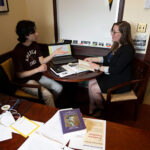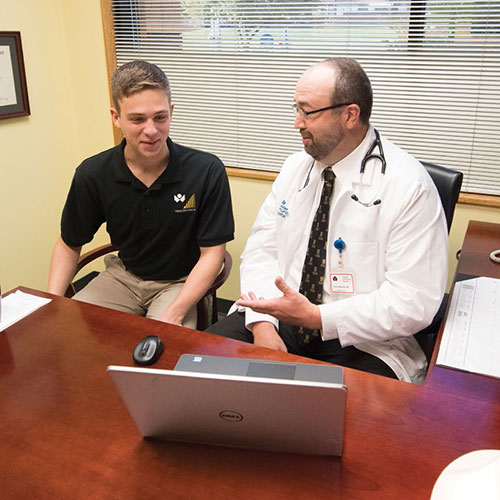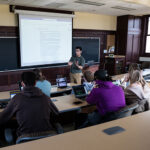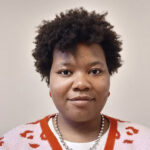
Student health coaches act as medical reporters for community network

When Scott Perkins ’20 enters the home, he may be checking for sugary and fatty foods in the fridge or full pill bottles on the counter and observing other clues to his patient’s health that day, but his first goal is to really make the patient feel comfortable with his presence and maintain the trust he’s working to build. Though he may sound like a doctor making house calls, Perkins is a Wooster student from the Health Coach Program, part of a partnership with Wooster Community Hospital called the Community Care Network.
Started in 2013, the Community Care Network brings together doctors and medical professionals from the Wooster community to train students from The College of Wooster as health coaches that help fill the gap for patients in the community who need more support. “These are patients that don’t have family support structures and might otherwise fall through the cracks. They’re apathetic and not motivated to do things for themselves,” said Dr. Paul Nielsen ’95, Wooster alumnus and co-medical director of the network. As a heath coach volunteer, Perkins sees it as his role to “work with patients to understand where they’re at, ask them what they want to achieve, and then walk alongside them to get there.”
Before Perkins and the other Wooster students in the Health Coach Program—a total of nearly 100 are expected to participated in the 2018-19 academic year—start to build relationships with patients, they complete a seminar taught by volunteers in the community including family practitioners, medical specialists in cardiology and lung disease, dieticians, and more, explained Robyn Laditka ’01, pre-health and academic support advisor at the College. “Every week is a different lecture, so they get a broad medical education,” she said. Any student seeking experience interacting with patients may apply for the program including those interested in nursing, physical therapy, and dentistry—not only medical school. Once students successfully complete the course, they’re assigned one or two patients to visit on a weekly basis throughout the semester, while regularly communicating with doctors and nurses in the Community Care Network.
Students enter the patient’s home for the first time accompanied by a nurse and later work with the team to come up with a plan for the patient’s improvement. As Perkins explained, it’s all about building trust. “It’s really tempting to go in there and tell them what to do, but it’s more important to take time to listen and build trust even before you start working on medical objectives. It’s important to step back and build the relationship. Once you have that then the patient can trust you to do some things to improve their health.” Typically, patients in the program made frequent visits to the doctor or emergency rooms. “One thing that a lot of patients struggle with is medication compliance,” said Perkins. “Maybe they have many complicated diseases all at once: heart disease, kidney failure, and diabetes can be a lot for them to juggle. What we do as health coaches is help them understand what’s going on, improve their medication compliance, and learn to have a healthy lifestyle.”
Within the first year of the program, Nielsen said they saw a 50 percent reduction in hospital visits from patients working with student health coaches. “Just establishing that relationship made the patients care about themselves more,” he explained. “They were trying to help the student succeed by taking their medicine more or weighing themselves or doing whatever we were trying to do to make them better.” Nielsen and his colleagues see the program and partnership as a win for everyone: the students, the patients, and the hospital. “The hospital has a way of monitoring these individuals to be able to keep them healthy and out of the hospital,” said Alex Davis, director of the Community Care Network for Wooster Community Hospital. “In addition to lower rehospitalization rates, we’ve also seen benefits we never thought of. We’re getting people into resources that they didn’t know they needed: diabetic education, podiatry exams, and we’re able to refer patients to hospice or assisted living.”
Because the students meet with the patients every week, they’re exposed to more information than the doctors. “When someone walks into a doctor’s office, the doctor only sees a slice of them,” said Perkins. “Since I’m not making diagnoses or anything I’m really like a medical reporter. The doctor doesn’t see inside the patient’s home, so I make all these observations and report them to the doctors and nurses.” Every other week during the semester, students meet with the doctors to give reports with an approach similar to hospital rounds. Nielsen explained that because of time constraints, his visit and relationship with a patient has to be compact.
“I look forward to augmenting my relationship with patients in the program because the students do have that time in their house to learn about what’s going on and report that information back to me,” he said. Not only do the meetings allow the doctors to learn more about the patients, they act as an opportunity for students to have an experience similar to medical school as undergrads. Perkins, a neuroscience major considering med schools in Ohio, sees this as a great opportunity to get a better sense of what type of medicine interests him. “If I find this is something I really enjoy, a healthcare specialty that’s more patient interaction intensive will be good. If I find that isn’t what I want to do, maybe something that’s less patient care interaction intensive would be better for me. The health coach program is helping me to figure that out,” he said. In her work with Wooster students in the program, Laditka has seen the experience have a real impact on the student’s path. “It’s eye opening for students to see some of the conditions and struggles that patients go through. Sometimes they have an idealized image of healthcare: ‘I’m going to help people and change the world.’ Through their experiences as health coaches they see what patients are struggling with on a daily basis. It makes them stronger health professionals,” she said. Further, as health coaches, students gain experience that makes them more competitive when applying for programs. “Medical schools are looking for hands-on patient experience, and it’s really hard to get,” she added. “Other options like EMT certification or becoming a certified nurse’s assistant involve added costs and time. Here it’s built into the curriculum.”
Giving students this type of experience is something Nielsen considers an ideal way to give back to support students on a similar path to his own. “My journey has been long and arduous to get where I am, and if I can make it easier for them, that’s what I want to do, inspire them to believe that they can do it,” he said. After graduating from Wooster with a degree in biology but not getting into medical school right away, Nielsen worked at the Ohio Agricultural Research and Development Center and served as a firefighter and paramedic in the area before completing his medical degree and becoming a family practitioner. “I don’t want students to have to go that long a route even though it was a success story for me,” he added.
While at Wooster, Nielsen remembers how the classes and professors pushed him to succeed, particularly a class in mammalian physiology taught by retired professor Michael Kern. “I did very well on the final exam and not as well during class, and when I sat in his office afterwards, he looked at me and said, ‘This is what you’re capable of, what I would expect from you.’ It stuck with me and going forward I had the confidence that I could do it.” As he works with students in the Health Coach Program, Nielsen tries to instill that same sense of confidence. “That’s something I learned right away in meetings with Dr. Nielsen,” said Perkins. “He’s very willing to ask questions and put you on the spot. He’s really pushing us to do our best quality of work.” Not only adding to their medical experience, Nielsen wants students to see the importance of building a relationship with patients. “When a patient comes into the room, I can look at them and know within a second how sick a person is that day because of the continuity I’ve had. That’s something you learn with experience and time as a family doctor, and I want these students to start developing those skills, so they have that same relationship and ability to see things that you can’t teach in books or a classroom.” He’s enjoyed seeing the students come to care for their patients and think of their role not just as a student job but a way to really help someone.
As Perkins starts his third year as a health coach this fall, he feels like he has “more experiences in my tool kit” when he enters patient’s homes, and he is looking forward to continuing. “It’s a great learning experience as far as intrinsic knowledge, learning about diseases, and medications. It’s also just really rewarding. I get home every day, and I feel like I’ve really helped someone. I feel like I’ve really impacted someone’s life and that’s a great feeling.”
Posted in Experiential Learning on October 31, 2018.
Related Posts
Related Areas of Study
Pre-Health
Guidance on course selection, research opportunities and other planning for medical and dental school
Pre-Professional AdvisingNeuroscience
Psychology, chemistry, philosophy, computer science, and other disciplines combine in the study of the nervous system
Major

